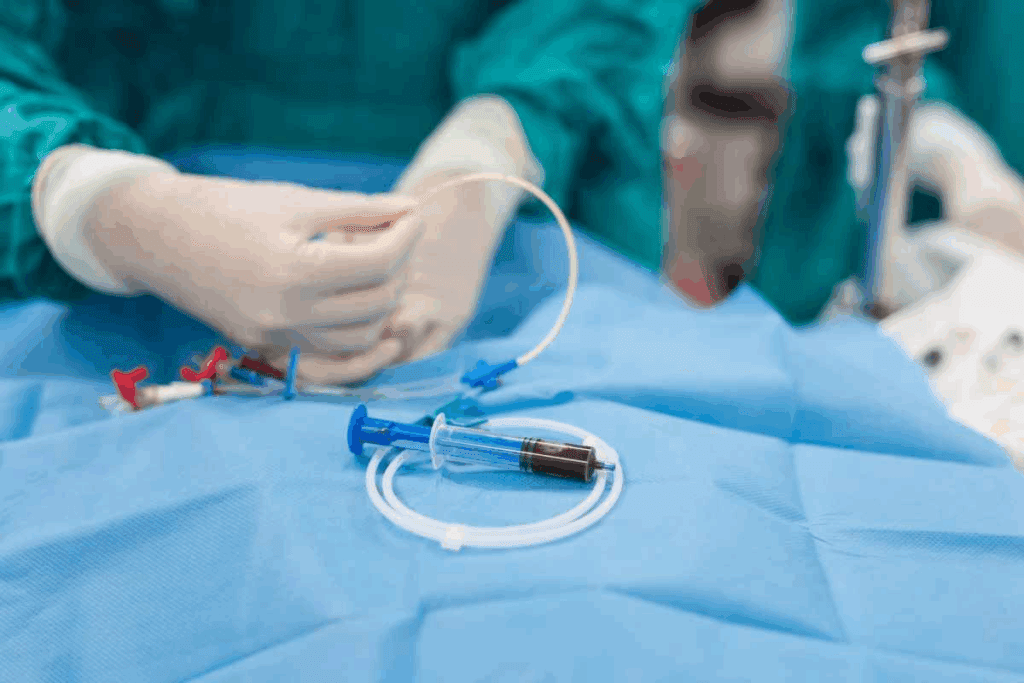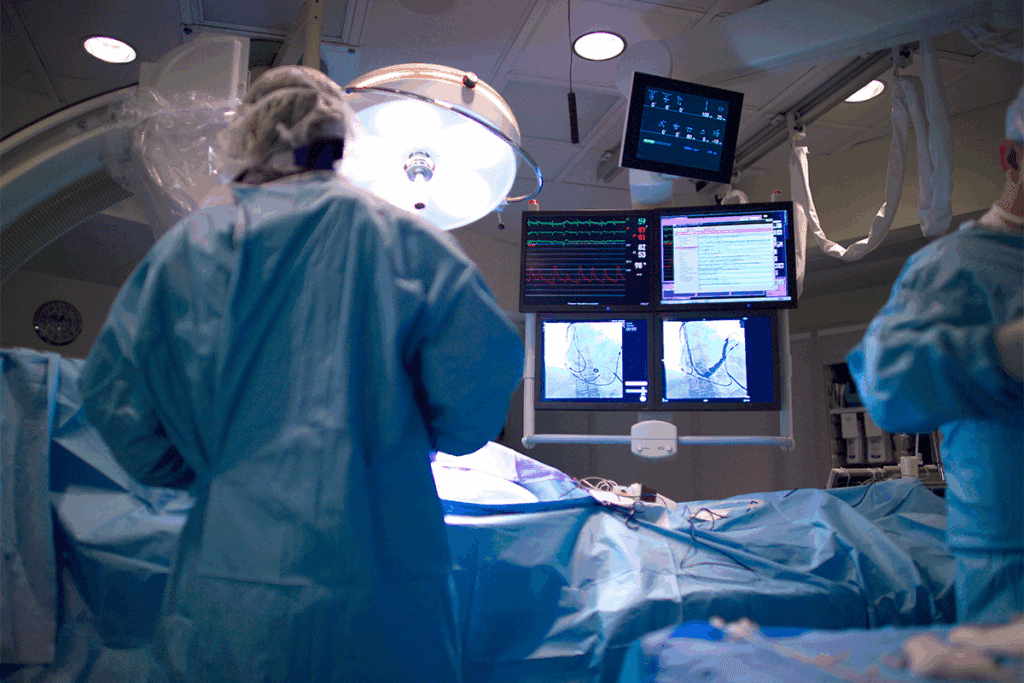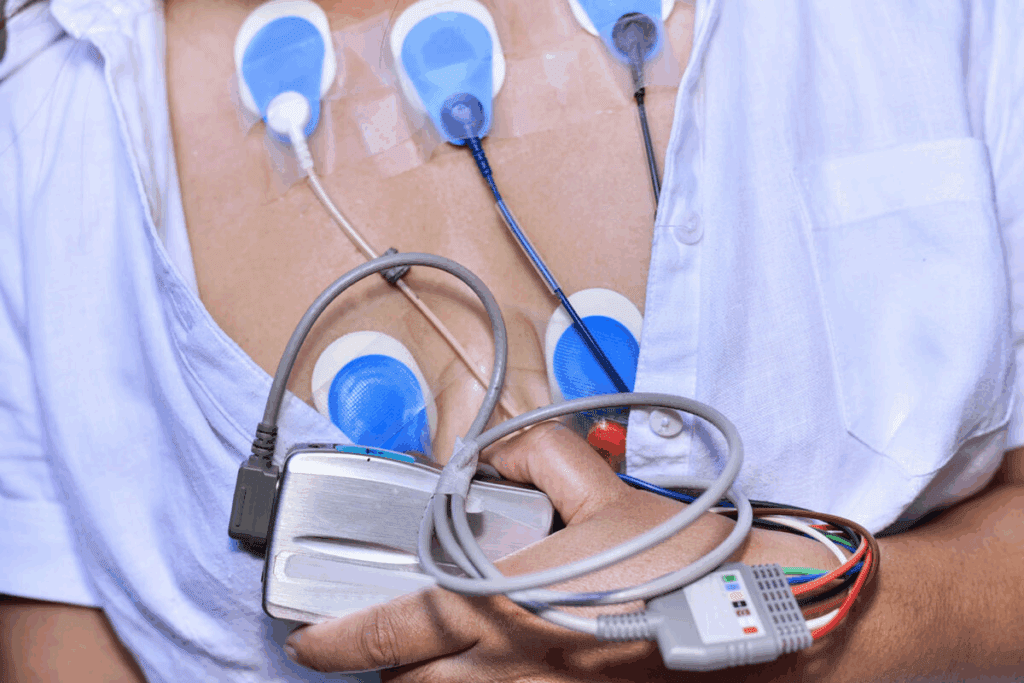Last Updated on October 31, 2025 by Batuhan Temel

Feeling tired after cardiac ablation is common, mainly in the first few weeks. At Liv Hospital, we know this fatigue is normal. It’s part of your heart healing.
Cardiac ablation is a procedure to fix irregular heartbeats. Feeling tired is natural as your body heals. Our team helps you through the recovery timeline, making sure you heal safely and well.
We’re here to support you at every step. We offer personalized care and expertise. This helps you get stronger and go back to your usual activities.

Cardiac ablation is a treatment for irregular heart rhythms. It destroys the faulty electrical pathways in the heart. This is for patients who don’t respond to other treatments.
Knowing what happens during the procedure helps prepare for recovery. It affects heart tissue and energy levels.
Catheters are inserted through a vein in the leg and guided to the heart during the procedure. These catheters deliver energy to the heart tissue causing irregular heartbeat. The energy creates small scars on the heart tissue.
These scars disrupt the abnormal electrical signals. This helps restore a normal heart rhythm.
The procedure is done in an electrophysiology lab by a cardiologist. It takes several hours. Patients might feel some discomfort during recovery.
The procedure creates lesions in the heart tissue. This blocks abnormal electrical signals. But, it also stresses the heart tissue.
Patients often feel tired after the procedure. This is because the body is healing. It’s repairing the areas where the catheters were used.
Energy levels after ablation vary. Some feel tired for days, others for weeks. The extent of the procedure and overall health influence recovery.
It’s normal to feel tired, but monitor symptoms. Report any concerns to your healthcare provider. This ensures a smooth recovery and addresses any issues early.

Feeling tired after cardiac ablation comes from your body healing and the effects of anesthesia and medication. Knowing why helps you deal with your symptoms and get through recovery.
After cardiac ablation, your body starts to heal naturally. This healing involves fixing the heart tissue where the ablation was done. This effort can make you feel tired. It’s important to rest and let your body heal.
Anesthesia and medications used during and after cardiac ablation can affect your energy. These substances can make you feel drowsy and tired as your body processes and gets rid of them.
Common side effects include:
These effects are usually short-lived and go away once the medications leave your system.
Recovering from cardiac ablation isn’t just about physical health. It also involves emotional and psychological aspects. The stress and anxiety from the procedure can make you feel exhausted.
It’s key to take care of your emotional and psychological well-being during this time. Activities like meditation, deep breathing, or talking to loved ones can help with emotional stress.
Understanding the reasons for your tiredness after cardiac ablation helps you manage your recovery better.
Knowing what to expect in the first 48 hours after cardiac ablation can make your recovery easier. Your body starts healing right away. It’s important to rest well and follow your doctor’s instructions closely.
Right after the procedure, you’ll go to a recovery area. Medical staff will watch your vital signs. You might feel sore where the catheter was inserted, but medicine can help.
Feeling groggy or disoriented is common because of the anesthesia. This feeling usually goes away in a few hours.
Some people need to stay in the hospital overnight for observation. Your doctor will tell you how to care for your wound and manage your medicine.
How long you need to rest in bed varies. It depends on your health and the procedure. Keep your leg straight if the catheter was in your groin to prevent bleeding. Your doctor will give you specific rest instructions.
Most people rest for 4 to 6 hours. During this time, only get up to use the restroom. Even then, you might need help. After resting, you can start doing normal things again, as your doctor advises.
| Activity | Recommended Duration of Rest | Guidelines |
| Bed Rest | 4-6 hours | Avoid strenuous activities; follow healthcare provider’s instructions |
| Resuming Normal Activities | Gradually over 24-48 hours | Start with light activities; avoid heavy lifting and bending |
By understanding the recovery process and following the guidelines, you can have a smoother recovery after your cardiac ablation procedure.
As you move through the early recovery phase after cardiac ablation, it’s key to understand your body’s changes. Days 3-7 might see you feeling more like yourself. Yet, it’s vital to keep an eye on your energy and manage your activities carefully.
Fatigue is a common symptom after cardiac ablation, and it can vary a lot. Some people might see their energy levels improve slowly, while others might feel it go up and down. It’s normal to feel tired, as your body is healing from the procedure.
In the first week, you might have days where you feel more energetic, followed by days where you’re more tired. This change is usually because of how your body reacts to the ablation and the meds you’re taking.
Managing daily activities in the early recovery phase needs a balance between rest and activity. It’s key to listen to your body and not overexert yourself. Here are some tips to help you manage your daily routine:
To show how to manage daily activities well, consider the following table that outlines a sample daily routine:
| Time | Activity | Rest |
| 8:00 AM | Breakfast | |
| 9:00 AM | Light stretching | |
| 10:00 AM | Rest period | |
| 12:00 PM | Lunch | |
| 1:00 PM | Short nap (optional) | |
| 3:00 PM | Short walk | |
| 4:00 PM | Rest period | |
| 6:00 PM | Dinner |
By balancing rest and activity, you can help your recovery and manage your energy better during the early recovery phase.
Recovering from cardiac ablation can be tough, with weeks 1-4 being the hardest. Your body is healing, and you might feel really tired. Knowing what to expect can help you recover better.
Several reasons make post-ablation fatigue worse in weeks 1-4. Your body is healing fast, using a lot of energy. Also, starting to do more things again makes your body work harder, leading to more tiredness.
The healing process fixes your heart and gets your body back to normal after the procedure. This process is hard on your body, making you feel very tired.
It’s normal to feel tired, but some symptoms are a big worry. Concerning symptoms include bad chest pain, trouble breathing, dizziness, or heartbeats that don’t feel right.
Watching your symptoms closely is key. Write down how tired you feel, any pain, and other symptoms. This info is helpful if you need to talk to your doctor.
If you have any worrying symptoms, call your doctor right away. They can help or take action if something’s wrong.
Knowing what to expect in weeks 1-4 and watching your symptoms can make this tough time easier.
Knowing how long it takes to recover from ablation surgery is key. It helps patients plan when they can get back to their usual life. The time it takes can change a lot, based on your health and if any problems come up.
Every person’s recovery from cardiac ablation is different. Yet, there are common steps most people go through. Here’s what you might expect:
| Week | Typical Recovery Milestones |
| 1-2 weeks | Rest and limited activity; gradual improvement in energy levels |
| 2-4 weeks | Increased mobility; return to light activities and basic daily routines |
| 4-6 weeks | Most patients can resume normal activities, including work and exercise |
Keep in mind, these are just general guidelines. Your actual recovery time might be different, based on your health and the details of your surgery.
Several things can change how fast you recover from ablation surgery. Overall health is a big factor, as healthier people usually heal faster. If you had any problems during or after the surgery, it could slow down your recovery.
“The key to a smooth recovery is closely following your doctor’s instructions and being patient with your body’s healing process.” – Medical Expert, Cardiologist
Other things that can affect your recovery include age, the type of ablation procedure performed, and how well you follow your doctor’s care instructions after the surgery. By knowing these factors and working with your healthcare team, you can make your recovery better.
As you go through your recovery, staying informed and proactive is very important. This way, you can get back to your normal life as quickly and safely as possible.
The type of cardiac ablation procedure you have can change how you recover. While recovery basics are similar, each procedure has its own unique aspects. These differences affect what patients can expect.
SVT ablation is a common procedure with a relatively easy recovery. Most people can get back to normal in a few days to a week. SVT ablation recovery is often quick, with little discomfort and a fast return to energy.
Some fatigue might occur, but it usually goes away in a few days. The success rate is high, and many see a quick drop in SVT episodes.
AFib ablation is more complex than SVT, leading to a tougher recovery. AFib ablation recovery often means feeling tired for weeks.
This tiredness comes from the procedure’s complexity and the body’s inflammatory response. The procedure involves creating lesions around the pulmonary veins.
AV node ablation is unique, involving the AV node and often a pacemaker. The AV node ablation recovery is influenced by both the ablation and the pacemaker.
Patients may feel moderately tired, like with other ablations. But, the pacemaker can also impact recovery. Some need to adjust to the new pacing mode.
In conclusion, while recovery basics are similar, the procedure type greatly influences the experience. Knowing these differences helps patients prepare for their recovery.
Cardiac ablation can cause several symptoms after the procedure. It’s important to know how to manage these symptoms for a smooth recovery. We’ll help you understand and deal with common symptoms.
Shortness of breath is a common symptom after cardiac ablation. It’s normal but watch its severity and how long it lasts. If it gets worse or is severe, see your doctor.
Palpitations are common after cardiac ablation. They usually go away as your heart heals. But, if they’re severe or don’t go away, get medical help.
Feeling tired after arrhythmia episodes is common. Your body works hard to handle irregular heart rhythms. Resting is key during these times. If tiredness lasts or affects your daily life, talk to your doctor.
Some symptoms after ablation are normal, but others need attention. If you have severe symptoms like hard breathing, chest pain, or persistent palpitations, get help right away. Also, if you’re worried about your symptoms or recovery, it’s best to talk to your doctor.
After cardiac ablation, many patients face sleep challenges. These can include insomnia or feeling too tired. Such issues can slow down recovery and affect overall health.
Patients may struggle with sleep during recovery. They might find it hard to fall asleep or wake up often. Discomfort, anxiety, or medication changes can cause these problems.
Common causes of sleep disturbances:
Improving sleep quality is key during recovery. Here are some tips to help:
Keeping a regular sleep schedule and avoiding big meals before bed can also help. For some, keeping a sleep diary can reveal patterns and causes of sleep issues.
| Strategy | Description | Benefit |
| Consistent Sleep Schedule | Go to bed and wake up at the same time daily | Regulates body’s internal clock |
| Relaxing Bedtime Routine | Engage in calming activities before bed | Signals body that it’s time to sleep |
| Sleep-Conducive Environment | Ensure bedroom is dark, quiet, and cool | Improves quality of sleep |
Understanding sleep issues and using practical tips can improve sleep during recovery. Be patient and flexible, as it may take time to see improvements.
Knowing when and how to get back to normal activities is key for a good recovery after cardiac ablation. We’ll help you understand how to start exercising again, go back to work and social events, and plan for driving and travel.
Starting to exercise again is important, but do it slowly. Usually, you can start with light activities like walking a few days after the procedure. It’s important to listen to your body and not push too hard.
Here’s a basic plan for starting to exercise:
| Time Post-Ablation | Activity Level | Examples |
| First few days | Light | Short walks, light stretching |
| 1-2 weeks | Moderate | Brisk walking, light aerobics |
| 4-6 weeks | Normal | Going back to your usual exercise routine |
Going back to work and social activities should also be done slowly. Most people can go back to work in 3-7 days, depending on their job and how they feel.
For social events, it’s best to avoid crowded places and hard activities for at least a week. It’s important to listen to your body and not overdo it.
Planning for driving and travel needs careful thought. It’s usually advised not to drive for at least 24 hours after the procedure, and longer if you were sedated.
For long trips, it’s best to wait at least 2 weeks. If you must travel, make sure to take breaks to move around and stay hydrated.
Cardiac ablation can greatly reduce arrhythmia symptoms. But, its long-term success depends on many things. We need to look at what affects its lasting benefits.
The benefits of cardiac ablation can last differently for everyone. Research shows many people get long-term relief from arrhythmia symptoms. For example:
These numbers show cardiac ablation can be very effective. But, results can vary. Things like the heart condition, other health issues, and the procedure’s technique can affect long-term success.
Some people might need more ablation procedures. This can happen for a few reasons:
Seeing a cardiologist regularly is key. It helps keep track of how well the procedure is working and catches any problems early.
Many people feel more energetic after cardiac ablation. But, how long it takes can vary:
Everyone recovers at their own pace. Staying healthy, exercising regularly, and eating well can help keep energy levels up.
Understanding what affects cardiac ablation’s long-term success helps patients. It lets them work with their doctors to get the best results.
As we wrap up our guide on cardiac ablation recovery, we hope you now understand what’s ahead. Cardiac ablation is a big deal, and knowing about recovery can ease your worries. It makes the journey smoother.
Recovery needs patience, support, and a good grasp of the process. We’ve covered the usual recovery time, symptoms, and tips for managing it. This guide helps you tackle the challenges of recovery and work towards better heart health.
Your recovery from cardiac ablation is special, and talking to your doctor is key. They can help with any concerns or questions. With the right help, you can get through recovery and enjoy better heart health.
Feeling tired after cardiac ablation is common. It’s because your body is healing, you might have been under anesthesia, and some medications can make you feel fatigued. It’s normal to feel tired as your body recovers.
Normal symptoms include feeling tired, soreness or bruising at the access site, and mild discomfort in the chest or groin area. Some people might also feel palpitations, shortness of breath, or dizziness.
Recovery time varies, but most people can get back to normal activities in a few days to a week. It can take several weeks to fully recover. It’s common to feel tired for up to 4-6 weeks after the procedure.
You’ll need to rest in bed for 24-48 hours after the procedure. Avoid doing strenuous activities and heavy lifting during this time.
AFib ablation can make you tired because of your body’s response to the procedure and changes in heart rhythm. Medication side effects can also contribute to fatigue. It’s important to follow your doctor’s advice on managing symptoms and getting back to activities.
To sleep better, try a relaxing bedtime routine, avoid caffeine and electronics before bed, and keep your sleep environment comfortable. Elevating the head of your bed can also help reduce discomfort.
You can start with light activities a few days after the procedure and gradually increase them over the next few weeks. This includes getting back to work, exercise, and social activities as your body allows.
The benefits of cardiac ablation can last differently for everyone. It depends on the type of arrhythmia and your heart health. In some cases, it can provide long-term relief, while others might need more procedures.
Most people see their energy levels improve over time as their heart rhythm stabilizes. But, some might continue to feel tired or have energy ups and downs, mainly during the initial recovery period.
Arrhythmia episodes can make you tired because of the irregular heart rhythm. This can decrease cardiac output and increase energy use. Managing your arrhythmia symptoms and following your treatment plan can help reduce exhaustion.
Contact your doctor if you have severe or worsening symptoms like chest pain, shortness of breath, dizziness, or palpitations. Also, seek medical attention if you notice signs of infection, such as redness, swelling, or drainage at the access site.
National Center for Biotechnology Information. (2025). Why Am I So Tired After Cardiac AblationRecovery. Retrieved from https://pmc.ncbi.nlm.nih.gov/articles/PMC8801207/).
Subscribe to our e-newsletter to stay informed about the latest innovations in the world of health and exclusive offers!
WhatsApp us